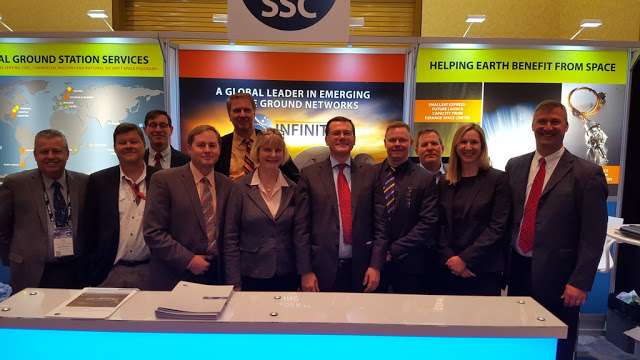Swedish company introduces new ground operations service for small satellites

The Swedish Space Corporation (SSC), a company providing advanced space services, announced on Wednesday, April 13, its newest project dedicated to lowering the operational costs of small satellites. The new product, called SSC Infinity, is a set of new ground operations services that will utilize full-motion antennas in the five-meter or smaller class. The company hopes that its newest offer will reduce risks associated with satellite launch, insertion, system and constellation checkout.
The system was presented at the 32nd Space Symposium in Colorado Springs, Colorado. It consists of a range of highly automated services that use full-motion antennas. These antennas are optimized for communication with small satellites and constellations. If needed, they could be also augmented with larger ones to support the most demanding small spacecraft or even constellations of satellites.
According to the company official, SSC, due to its vast experience in building technologically advanced space services, has mastered the development of ground operations systems. Thus, creating Infinity wasn't really a big challenge for the company.
"The development itself wasn't extremely challenging because of our experience in the space industry as a long-term supplier of this type of service. However, there was a bit of a challenge to us and that was to continue to work to destroy old mental models that result in legacy aerospace and ground systems thinking. We have to continuously remind ourselves that we are in a new phase of the development of our industry that some people are calling New Space 2.0. So SSC has had to do quite a bit of soul-searching to understand what our place would be in the industry, and we decided that we had to disrupt ourselves and really begin to be the thought leader in our industry. Once we decided to do that, the rest became very easy," Kevin Mortensen of SSC told SpaceFlight Insider.
Infinity will make use of normal configurations and standardized ground system hardware to support miniaturized satellites known as CubeSats. The system will reduce costs related to pre-mission configuration by limiting the number of mission configurations and using pre-qualified radios.
"We have made some really interesting uses of automation and smaller antennas that are deployed in an architecture that allows the ground station to appear as any other internet access point, which can extend all the way to the spacecraft if the CubeSat designer adheres to standards. By making use of web scheduling and cloud-based services, we expect to produce savings on the order of a factor of ten," Mortensen noted.
The new system builds upon a broad hardware network developed by SSC. The company has already begun installing new small aperture antennas as part of its Universal Space Network expansion. With ground stations at strategic locations around the globe, SSC can provide unmatched coverage allowing frequent satellite contacts for telemetry, tracking and command, as well as data download with low-latency data recovery.
Founded in 1972, SSC has been active and successful in many fields of space technology, including the design of entire space missions. So far, the company has developed eight scientific satellites, 60 scientific payloads and more than 60 rocket vehicles. SSC has launched 500 rockets, 550 balloons and has communicated with over 100 satellites of various types.
The company is currently working on a variety of new projects, which includes expanding its program for a space propulsion system that uses environmentally friendly propellants and also expanding its micro electro mechanical systems (MEMS) technology in the coming years. MEMS is the integration of electronics and mechanical structures at the micrometer scale through advanced micro-fabrication technology.
"However, the most exciting project, which also makes it the most complex and hardest to do, is a program we call 'SmallSat Express' which is a new capability for launching small satellites from the Esrange launch facility in Northern Sweden. This is going to be quite complex and require a lot of coordination and cooperation with the space industry, but it is definitely achievable in the 2021 timeframe," Mortensen said.
SmallSat Express is a service tasked with launching satellites weighing 2.2 to 330 lbs. (one to 150 kg), with CubeSats as target payloads. It will bring spacecraft to a standardized orbit suitable for most small satellites—a sun-synchronous orbit (SSO) at an altitude of about 310 miles (500 km). Thanks to this service, a constellation of satellites can be established through three consecutive launches. According to the project, Esrange facility will be a "green" launch site, replacing hydrazine with green propulsion systems.
Source: Astrowatch.net





















